| |

|
DeLoG NEWSLETTER
Special Edition: Gender and DLG – 03/2022
|
|

|
| |
|
|
| |
Dear Reader,
This DeLoG Newsletter reaches you in very difficult and challenging times. The DeLoG Secretariat is deeply concerned and saddened by the ongoing war in Ukraine. Our thoughts are with the people in Ukraine.
This edition of the DeLoG Newsletter on the occasion of the International Women’s Day is overshadowed by these horrific events.
This special gender-focused issue presents innovative, gender-sensitive approaches to support decentralisation and local governance. Learn about development partners’ engagement for gender equality worldwide, their work for women empowerment in crises and fragile contexts, ongoing efforts to localise Agenda 2030 and SDG 5, as well as new insights into women representation in local finance and urban governance. All resources and news included were collected among our members and partners. Special thanks to all of you who actively contributed to this project!
Make sure you check out the focus interviews in Spotlight. Would you like to find out more about gender-sensitive fiscal decentralisation in Mozambique? Are you interested in the pathways municipalities in Canada are taking to align with the country’s feminist foreign policy or how Sida is supporting worldwide to empower women in their communities? We asked Elena Pierce from the Federation of Canadian Municipalities (FCM) and the Capacity and Institutions Building (CIB), Ramon Cervera from UNCDF Mozambique, and Lotta Sylwander from the Swedish International Development Cooperation Agency (Sida) to tell us how gender mainstreaming is finding its way on the global decentralisation and local governance agenda.
Of course, DeLoG’s commitment to foster gender approaches in decentralisation and local governance does not end today. The Secretariat is working on amplifying the perspectives from civil society, especially women rights organisations and other initiatives to empower women locally. Stay tuned and follow our channels to get brand new updates on developments at DeLoG.
We hope you will find this issue insightful and that you might share it with colleagues and friends.
All the best and stay stafe!
Your DeLoG Team
Contact: [email protected] |
|
|
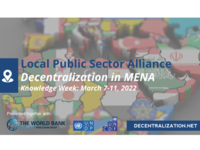
© 2015-2021 Local Public Sector Alliance
|
|
Webinar Series: Decentralisation and Local Development in the Middle East & North Africa
As part of the global webinar series on Decentralisation and Local Development around the World, the Local Public Sector Alliance invites to participate in the "Decentralization and Local Development in the Middle East & North Africa (MENA) – Knowledge Sharing Week''. Don’t miss the webinar on "Urban Governance, Social Inclusion and Fragility in the MENA region" co-hosted by DeLoG on March 10th. In a round table discussion, Neila Akrimi from VNG international will be talking about women’s participation in the MENA region.
|
| |
|
|
| |
|
|
|
|
|
News from our Members and Partners
|
|
|
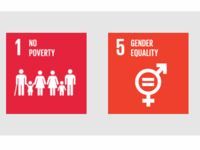
© UNDP
|
|
UNDP and the European Union Launch US $16.9 Million Programme to Support Women Entrepreneurs in Afghanistan
To prevent the collapse of the local economy, the UNDP in partnership with the European Union launched a US $16.9 million livelihood recovery initiative. As part of the ABADEI, a UN response to the crisis in Afghanistan, the project focuses on safeguarding women’s livelihoods and women-led small businesses.
|
| |
|
|
| |
|
|
|
|
|
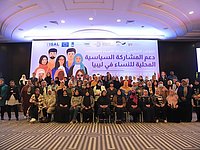
© VNG International
|
|
VNG Gender-Sensitive Local Governance and Women’s Empowerment in Libya
VNG International presents their work on advancing gender equality in Libya: "Despite the extremely challenging operational context, VNG International has been successfully carrying out activities in Libya since 2012 in support of decentralization and governance. The focus of our work is on capacity development of local and national governments, implementation of pilot projects across municipalities, developing the capacity of civil society, and inclusively engaging citizens. Central to our approach in Libya is to facilitate locally driven initiatives while bringing the local and national level together." Read the full article on the DeLoG website.
|
| |
|
|
| |
|
|
|
|
|
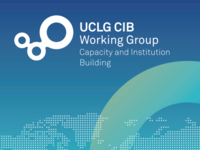
© UCLG CIB
|
|
UCLG’s CIB Working Group: Knowledge Hub on Gender Equality
UCLG’s Capacity and Institution Building (CIB) Working Group, with the support of the Federation of Canadian Municipalities (FCM), will deepen and expand the understanding of local government practitioners and elected officials on the importance of gender equality in local governance through international cooperation programming. The CIB Working Group, with its members, will develop a global knowledge hub aggregating local government experiences, best practices, and lessons learned for supporting gender equality in local governance. This will lead towards a more coordinated and effective mentorship, training, and program implementation with a gender perspective. Initiatives led by CIB members and partners, such as VNG International (Netherlands), SALAR (Sweden), the CLGF (United Kingdom), and NLC Cambodia, will be tied into the Knowledge Hub, reinforcing global efforts to support women in local government. The knowledge hub will be facilitated by engaging more local and regional governments and their associations on the topic of gender equality.
|
| |
|
|
| |
|
|
|
|
|
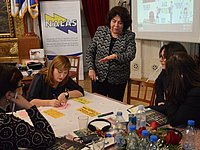
© NALAS
|
|
NALAS’ Contribution to Advancing Gender Equality at Local Level in South-East Europe
NALAS presents their work on advancing gender equality at local level in South-East Europe: "Do you want to see the glass half full? We might start this article by proudly saying that in 2021 we witnessed the highest percentage of women mayors in South-East Europe (SEE) since 2012, when the Network of Associations of Local Authorities of South-East Europe (NALAS) launched its strategy for advancing gender equality at local level." Read the full article on the DeLoG website.
|
| |
|
|
| |
|
|
|
|
|
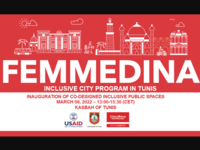
© Cities Alliance
|
|
Cities Alliance: Femmedina Opens Inclusive Public Spaces in Tunis
Cities Alliance and USAID in partnership with the City of Tunis are implementing the gender-focused project Femmedina in the historic centre of Tunis. The project’s name Femmedina is a combination of the terms "femmes” (women)" and "medina" (historical city). Through a broader process of women’s participation, the project aims to rehabilitate and activate public spaces in the historical city, and to make the Medina safer for women. On 09 March 2022, the first two public spaces of the Femmedina Inclusive City Programme will be inaugurated. You can listen to the voices of women from the Medina in a short video.
|
| |
|
|
| |
|
|
|
|
|
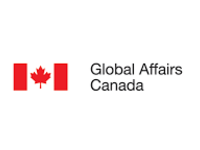
© Global Affairs Canada
|
|
Global Affairs Canada: Inclusive Local Governance Support in Haiti
In Haiti, Global Affairs Canada leads a joint project with UNDP on inclusive local governance support in light of the COVID-19 pandemic. The project aims to increase the capacity of Haiti’s local populations to participate in the development of their community. As part of the programme, training and mentoring opportunities for women mayors, and consultation workshops and awareness campaigns to better integrate the needs and concerns of women into local development are being held.
|
| |
|
|
| |
|
|
|
|
|
●●● Spotlight ●●●
|
|
|
Focus Interviews
|
|
|
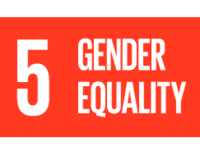
© United Nations
|
|
Working on DLG with a Gender Perspective
For this special gender edition of the DeLoG Newsletter on the occasion of International Women's Day, partner organisations of the network share their experiences working on DLG with a gender perspective. You can access the full interviews on the DeLoG website. Our three guests are:
|
| |
|
|
|
|
|
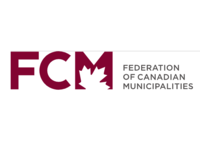
© Federation of Canadian Municipalities
|
|
Elena Pierce, Governance, Policy and Networks Advisor at FCM
Elena also represents FCM in the CIB Working Group, and she is an advocate for strengthening local governments in Canada and abroad. She also spent several years working to promote women running for municipal office.
Why should DeLoG as a network enhance its focus on the nexus of Gender and DLG in the future?
Elena: "The network can work toward a collective understanding of gender equality with the goal of more effective international cooperation. Further, network members should initiate discussions with local governments on the monitoring and evaluation of programs to ensure that disaggregated data collected is appropriate for determining if initiatives are achieving equitable outcomes." Read the full interview here.
|
| |
|
|
|
|
|
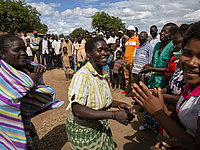
© UNCDF/Karel Prinsloo
|
|
Ramon Cervera, UNCDF
Ramon is team leader in Mozambique, where UNCDF has recently started the "Support Programme to Local Governments on Financing Local Resilient Development." Among its goals, facilitating participative and gender-sensitive local governance processes.
According to your personal experience, what can institutions and authorities do to integrate gender perspectives into local governance systems?
Ramon: "[A]ctivities need to consider the differentiated and complementary voices of women and men in the planning dialogue exercise. In the Financing Local Resilient initiative in Niassa Province, Mozambique, local governments are fine-tuning a gender-responsive methodology for the prioritization of adaptive infrastructure for local development; this locally led planning tool involves the dialogue between women, traditional-local leaders, youth and CSOs members, which facilitates the mainstreaming of women experiences and knowledge into decentralized governance decision-making processes and financing cycles." Read the full interview here.
|
| |
|
|
|
|
|

© Lotta Sylwander
|
|
Lotta Sylwander, Lead Policy Specialist Gender equality at Sida
Sida is an absolute landmark for matters related to women empowerment and gender equality in development cooperation. She has been working at Sida as Director for Africa and as Deputy Director General as well as consultant. Her professional focus has been gender issues, participatory methods, HIV/AIDS, child rights and overall management.
Why is the nexus of Gender and DLG relevant to SIDA?
Lotta: "Sida seeks to empower women and girls at all levels of society and believe that there will never be a true sustainable development without gender equality. We find that women can, and will, participate at local levels (community or local government) if given the possibility and space. Women are often more engaged in local issues and often know them better and can therefore develop more female centred sustainable solutions and plans for development." Read the full interview here.
|
| |
|
|
|
|
|
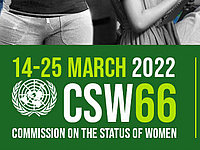
© Commission on the Status of the Women
|
|
Commission on the Status of Women - CSW66
When: 14 March - 25 March 2022
Where: Hybrid
Apply by: Registration open
The Commission on the Status of the Women (CSW), a functional commission of the Economic and Social Council (ECOSOC), is exclusively dedicated to the promotion of gender equality and the empowerment of women. This year’s priority theme is "Achieving gender equality and the empowerment of all women and girls in the context of climate change, environmental and disaster risk reduction policies and programmes." The review theme of the 66th session of the commission will be "Women’s economic empowerment in the changing world of work." The event will take place in a hybrid format.
Two side events of CSW66 will address the links between Gender and DLG.
|
| |
|
|
| |
|
|
|
|
|
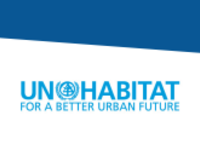
© City of New York, UN-Habitat
|
|
CSW66 Side Event - Towards Quito+6: Achieving Gender Equality and the Empowerment of all Women and Girls in Human Settlements in the Context of Climate Change, Environmental and Disaster Risk
When: 15 March 2022
Where: Online
Apply by: Registration will open soon
UN-Habitat and the Ministry of Foreign Affairs, European Union and Cooperation of Spain jointly host a panel discussion on the opportunities for accelerating action regarding gender equality and women’s empowerment in human settlements, in the context of the post-pandemic recovery programmes. The discussion will address the outline established by the Gender Resolution of 2019, UN Women new Strategic Plan, and the upcoming review of both the New Urban Agenda and of SDG5.
|
| |
|
|
| |
|
|
|
|
|

© UNCDF
|
|
CSW66 Side Event - Increasing Local Investments to Build Inclusive and Climate Resilient Cities
When: 16 March 2022
Where: Online
Apply by: Registration open
The United Nations Capital Development Fund (UNCDF) hosts a roundtable to discuss growing inequality and climate related vulnerabilities in cities. Building on knowledge generated by UNCDF initiatives like LoCAL, this side event addresses how to make cities of the future more inclusive and resilient for all citizens including women and youth. The event addresses underlying bottlenecks leading to inequalities in cities and measures to support vulnerable groups, such as better urban planning an increased investment in essential services and infrastructures.
|
| |
|
|
| |
|
|
|
|
|
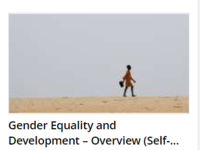
© The World Bank
|
|
Gender Equality and Development - World Bank Group
When: Self-Paced
Where: Online
Apply by: Registration open
|
| |
|
|
| |
|
|
|
|
|
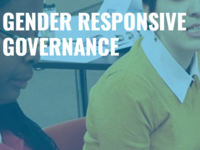
© The Hague Academy
|
|
Gender Responsive Governance - The Hague Academy
When: 14 November - 25 November 2022
Where: The Hague
Apply by: 07 October 2022
|
| |
|
|
| |
|
|
|
|
|
Knowledge
|
|
|
Fragility ● Post-conflict Settings ● Migration
|
|
|
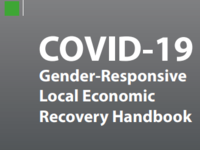
© UCLG, UNCDF and UNDP
|
|
COVID-19 Gender-Responsive Local Economic Recovery Handbook
UCLG, UNCDF and UNDP produced a comprehensive handbook which includes a concrete set of tools for practitioners to implement COVID-19 gender-responsive recovery programmes at the local level. The handbook presents how the COVID-19 crisis deepened gender inequalities and exacerbated pre-existing obstacles for women’s economic participation. It guides the reader through the five key steps to achieve gender-responsive participatory governance: Understand the major gender issues, assess the needs for structural transformation, plan a gender-responsive local economic recovery that aims to build forward better, ensure sufficient funds for the local economic recovery plan, and implement the gender-responsive local economic recovery plan.
Authors: Conisia Shumba, Ana Landa, Manita Ray et al.
Publisher: UCLG, UNCDF and UNDP
Publication Date: 2021
Copyright: UCLG, UNCDF and UNDP
|
| |
|
|
| |
|
|
|
|
|
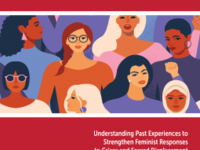
© Women’s Refugee Commission
|
|
Understanding Past Experiences to Strengthen Feminist Responses to Crises and Forced Displacement
The Women’s Refugee Commission published a report that provides advice on how to shift to a more inclusive, anti-racist, and feminist humanitarian response to crises and forced displacement. The report was made possible by funding support from the Government of Canada provided through Global Affairs Canada. Key elements of successful humanitarian responses identified included civil society engagement, respecting the expertise of local organisations outside the field of humanitarian aid, and flexible funding options.
Authors: Feminist Humanitarian Network, Mimidoo Achakpa, Cindy Clark, Megan Daigle et al.
Publisher: Women’s Refugee Commission
Publication Date: 2021
Copyright: Women’s Refugee Commission
|
| |
|
|
| |
|
|
|
|
|
Fiscal Decentralisation ● Local Finance
|
|
|
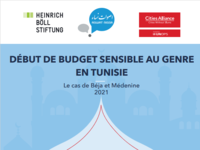
© Cities Alliance
|
|
Gender-sensitive Local Budgeting in Tunisia
The Tunisian NGO Aswat Nissa in partnership with Cities Alliance and Heinrich-Böll-Stiftung conducted a gender-responsive budget analysis in the municipalities Beja and Medenine. The summary report that was part of Cities Alliance’s "Improving gender-mainstreaming within local public policies" programme presents the necessity for local authorities to introduce methods of integrating a gender perspective in annual budgets, as well as for the establishment of consultation mechanisms with civil society organisations.
Authors: Cities for Women Global Programme, Aswat Nissa
Publisher: Cities Alliance
Publication Date: 2021
Copyright: Cities Alliance
|
| |
|
|
| |
|
|
|
|
|
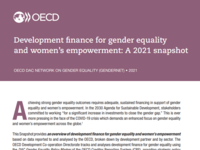
© OECD
|
|
Development Finance for Gender Equality and Women’s Empowerment: A 2021 Snapshot
OECD published an overview of development finance for gender equality and women’s empowerment in light of the COVID-19 crisis. As part of the publication, OECD presents data on bilateral aid to local women’s rights organisations and movements. The analysis is part of OECD Development Co-operation Directorate’s strategic analysis of financial assistance and gender. The findings feed into new guidance on gender equality and women’s empowerment in development co-operation.
Author: OECD DAC NETWORK ON GENDER EQUALITY
Publisher: OECD
Publication Date: 2021
Copyright: OECD
|
| |
|
|
| |
|
|
|
|
|
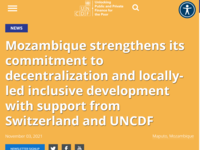
© UNCDF
|
|
Mozambique Strengthens its Commitment to Decentralization and Locally-led Inclusive Development with Support from Switzerland and UNCDF
The Government of Mozambique launched a project to channel funding via local governments to promote inclusive development and the decentralisation policy. With support from the Swiss Agency for Development and Cooperation (SDC) and technical assistance from UNCDF, the "Support Programme to Local Governments on Financing Local Resilient Development" aims to provide funding for locally led development and inclusive governance in three districts of Niassa Province. A central effort of the programme is capacity building and technical assistance to local authorities so that communities can actively participate in planning, budgeting, and other local governance processes in a gender-sensitive manner.
Author: Helvisney Cardoso
Publisher: UNCDF
Publication Date: 2021
Copyright: UNCDF
|
| |
|
|
| |
|
|
|
|
|
2030 Agenda ● Localising the SDGs
|
|
|

© UCLG CIB Working Group
|
|
Capacity Building for Gender Equality at the Local Level
In this publication, the CIB Working Group Secretariat analyses how UCLG’s political gender strategy influences programmes and projects at the local and regional level. Local and regional governments play an important role in creating inclusive communities and contribute to the joint achievement of the SDGs, such as the promotion of gender equality. The brochure includes technical tools, guidelines, and the results of twelve case studies.
Author: Sandra Ceciarini
Publisher: UCLG CIB
Publication Date: 2021
Copyright: UCLG CIB
|
| |
|
|
| |
|
|
|
|
|
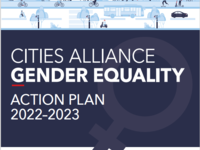
© Cities Alliance
|
|
Gender Equality Action Plan 2022-2023
Cities Alliance’s Gender Equality Action Plan 2022- 2023 provides guidance on how to ensure gender equality in all programmes and processes. The guide gives advice how to apply a gender lens in different areas of policymaking, such as city planning, budgeting, and development strategy. Key objectives are the systematic and comprehensive contribution to promoting gender equality and women's empowerment, developing a premier global partnership working on women's engagement in cities, and raising awareness and resources for inclusive city planning and governance at local levels.
Authors: Cities Alliance
Publisher: Cities Alliance
Publication Date: 2021
Copyright: Cities Alliance
|
| |
|
|
| |
|
|
|
|
|
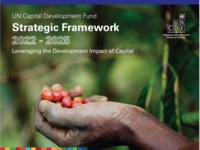
© UNCDF
|
|
UNCDF Strategic Framework 2022-2025
The UNCDF Strategic Framework 2022-2025 presents lessons learned working with public and private finance in least developed countries (LDCs). UNCDF finds that developing an impactful investment track record and investing in gender equality and women’s economic empowerment for sustainable results are central to successful programmes in LDCs. In the focus of the Strategic Framework is the new UNCDF offer: as a hybrid development organisation and development finance institution, UNCDF will deepen its engagement in the development areas of women’s economic empowerment, sustainable food systems finance, and climate, clean energy, and biodiversity finance.
Authors: UNCDF
Publisher: UNCDF
Publication Date: 2022
Copyright: UNCDF
|
| |
|
|
| |
|
|
|
|
|
Urban and Territorial Governance
|
|
|
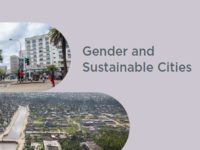
© The World Bank
|
|
Gender and Sustainable Cities – Guidance Note
Worldwide more than one billion slum dwellers are critically exposed and most vulnerable to climate risks. Women and girls often constitute the majority of slum dwellers and are disproportionally affected by the risks to climate change due to inequalities caused by socio-economic and cultural norms. The Guidance Note aims to support World Bank task teams and local authorities to consider gendered impacts of climate-related interventions in cities.
Authors: Marialena Vyzaki, Victoria Stanley, Michelle Morandotti
Publisher: The World Bank
Publication Date: 2021
Copyright: The World Bank
|
| |
|
|
| |
|
|
|
|
|
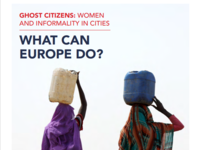
© Cities Alliance
|
|
Ghost Citizens: Women and Informality in Cities
In this policy brief, Cities Alliance highlights gender gaps in the multi-sectoral issue of informality. Globally, women are disproportionally overrepresented in informal economy and in informal settlements. Cities Alliance presents several recommendations for the EU Gender Action Plan III to boost and support national and local efforts to formulate and enact gender-equitable legislation that gives legal recognition to people who are living in informal contexts.
Authors: Giulia Maci and Felicity Kitchin
Publisher: Cities Alliance
Publication Date: 2021
Copyright: Cities Alliance
|
| |
|
|
| |
|
|
|
|
|
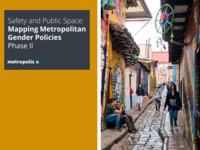
© metropolis
|
|
Safety and Public Space: Mapping Metropolitan Gender Policies Phase II
Following up on the 2018 project "Safety and Public Space: Mapping Metropolitan Gender Policies", metropolis presents the second phase of the project that analyses policies in place designed to address urban safety of women and girls in the public space. In Phase II, more participants and more depth were added to the study by classifying and analysing safety policies and the public space with a gender perspective. In this publication, metropolis summarises key takeaways of the study.
Editor: Silvia Llorente
Publisher: metropolis
Publication Date: 2021
Copyright: metropolis
|
| |
|
|
| |
|
|
|
|
|

© UN-Habitat
|
|
#HerCity – Let Her Guide You
UN-Habitat initiated Her City, a project that aims to involve girls in urban development and make cities more inclusive, equal, and sustainable. Her City provides urban actors and cities with tools and methods, such as nine building blocks as part of a digital guideline on how to co-plan cities from a girl’s perspective. The initiative focuses on the links between youth, gender and socioeconomic situation. It aims to contribute to the implementation of the SDGs on the local level.
Authors: UN-Habitat, Global Utmaning
Publisher: UN-Habitat
Publication Date: 2021
Copyright: UN-Habitat
|
| |
|
|
| |
|
|
|
|
| |
|
|
| |
For access to many more inspiring publications on
1. DLG in Contexts of Fragility, Migration and Post-Conflict Settings,
2. Fiscal Decentralisation and Local Finance,
3. Localising the 2030 Agenda or
4. Urban and Territorial Governance
make sure to visit the regularly updated "Knowledge Section" of our DeLoG Website!
|
|
|




























